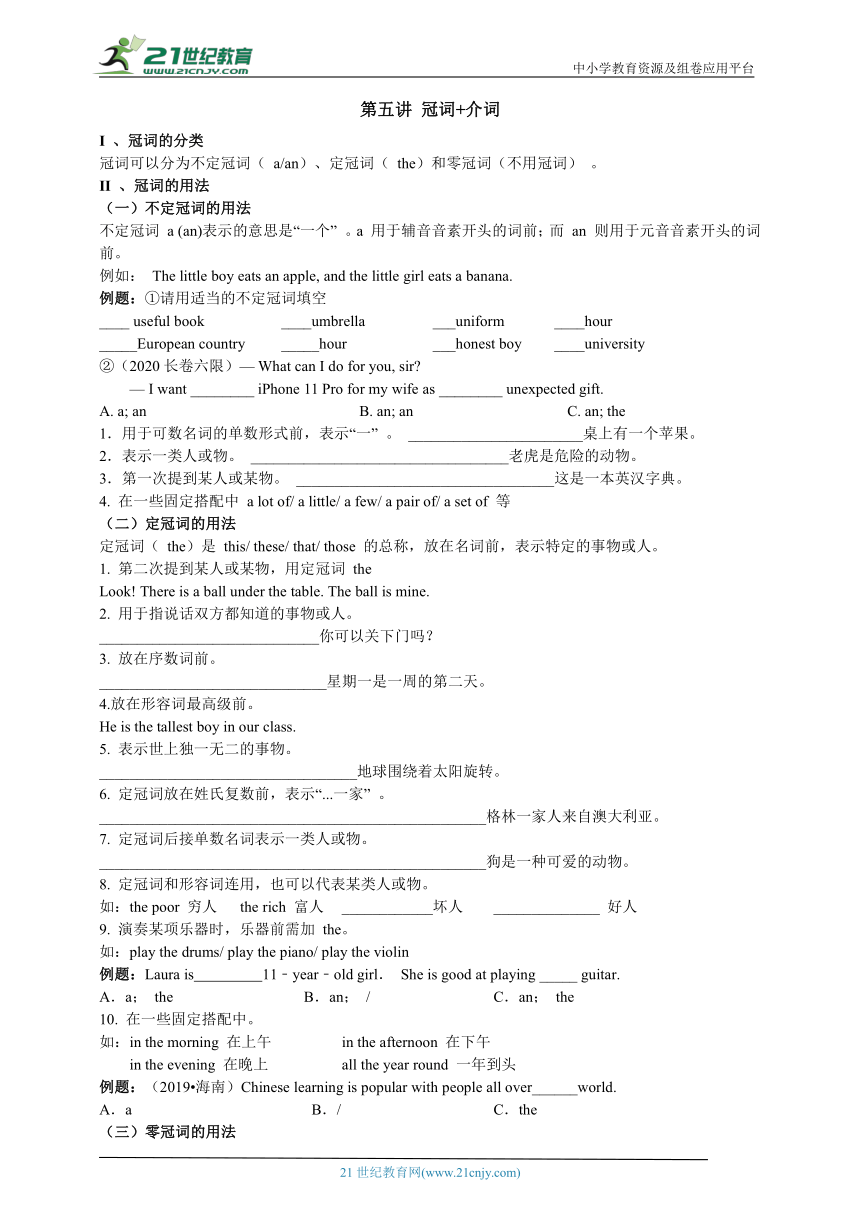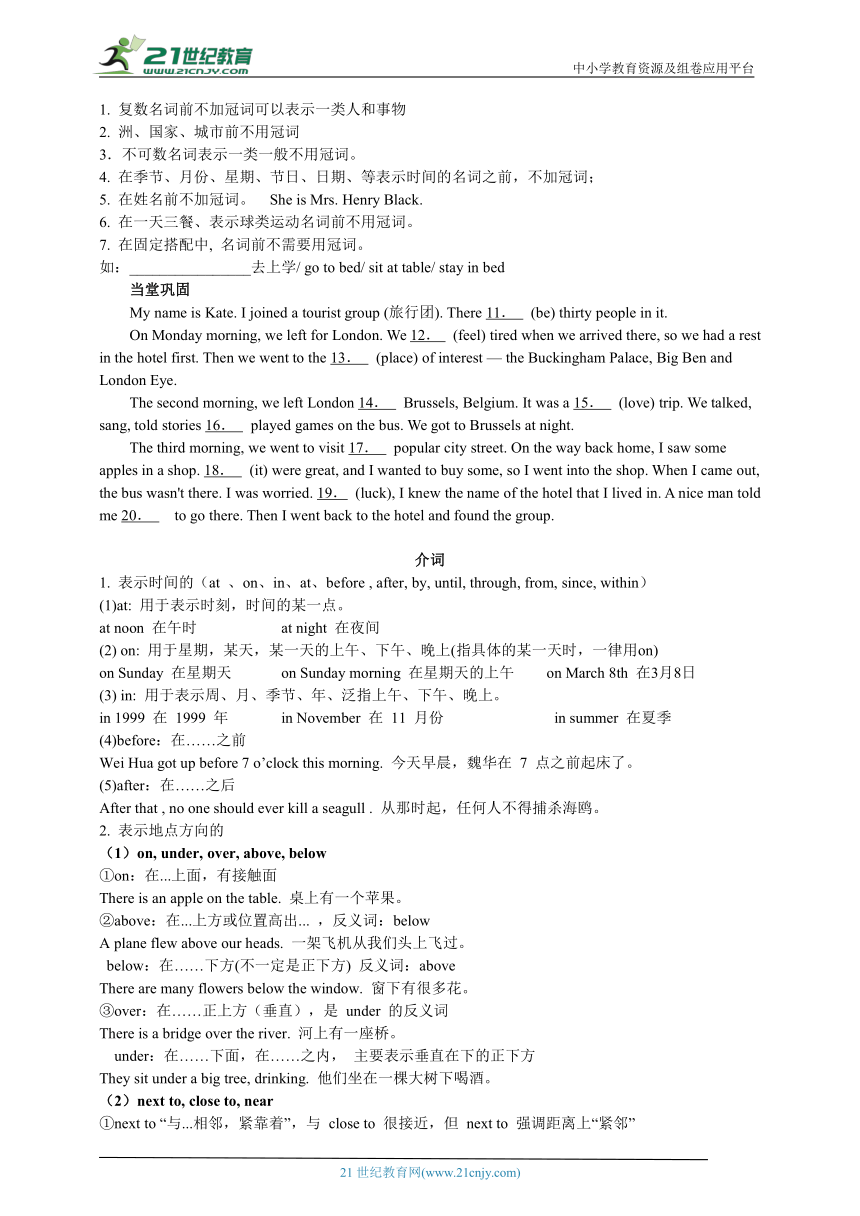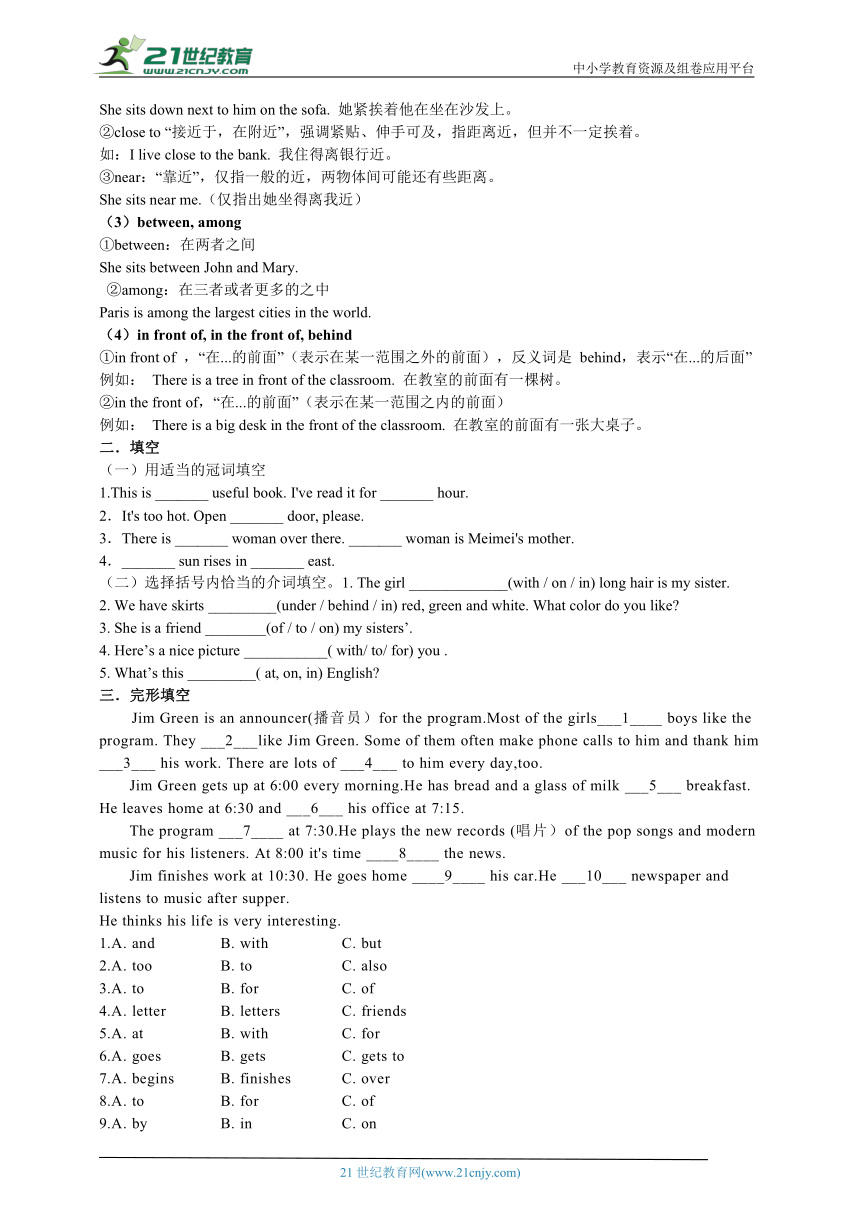【寒假学案】2024年人教版初一英语寒假教材学案 第五讲 冠词介词(含答案)
文档属性
| 名称 | 【寒假学案】2024年人教版初一英语寒假教材学案 第五讲 冠词介词(含答案) |  | |
| 格式 | doc | ||
| 文件大小 | 436.4KB | ||
| 资源类型 | 试卷 | ||
| 版本资源 | 人教新目标(Go for it)版 | ||
| 科目 | 英语 | ||
| 更新时间 | 2023-12-21 13:43:52 | ||
图片预览



文档简介
中小学教育资源及组卷应用平台
第五讲 冠词+介词
I 、冠词的分类
冠词可以分为不定冠词( a/an)、定冠词( the)和零冠词(不用冠词) 。
II 、冠词的用法
不定冠词的用法
不定冠词 a (an)表示的意思是“一个” 。a 用于辅音音素开头的词前;而 an 则用于元音音素开头的词前。
例如: The little boy eats an apple, and the little girl eats a banana.
例题:①请用适当的不定冠词填空
____ useful book ____umbrella ___uniform ____hour
_____European country _____hour ___honest boy ____university
②(2020长卷六限)— What can I do for you, sir
— I want ________ iPhone 11 Pro for my wife as ________ unexpected gift.
A. a; an B. an; an C. an; the
1.用于可数名词的单数形式前,表示“一” 。 _______________________桌上有一个苹果。
2.表示一类人或物。 __________________________________老虎是危险的动物。
3.第一次提到某人或某物。 __________________________________这是一本英汉字典。
4. 在一些固定搭配中 a lot of/ a little/ a few/ a pair of/ a set of 等
(二)定冠词的用法
定冠词( the)是 this/ these/ that/ those 的总称,放在名词前,表示特定的事物或人。
1. 第二次提到某人或某物,用定冠词 the
Look! There is a ball under the table. The ball is mine.
用于指说话双方都知道的事物或人。
_____________________________你可以关下门吗?
3. 放在序数词前。
______________________________星期一是一周的第二天。
4.放在形容词最高级前。
He is the tallest boy in our class.
5. 表示世上独一无二的事物。
__________________________________地球围绕着太阳旋转。
6. 定冠词放在姓氏复数前,表示“...一家” 。
___________________________________________________格林一家人来自澳大利亚。
定冠词后接单数名词表示一类人或物。
___________________________________________________狗是一种可爱的动物。
8. 定冠词和形容词连用,也可以代表某类人或物。
如:the poor 穷人 the rich 富人 ____________坏人 ______________ 好人
演奏某项乐器时,乐器前需加 the。
如:play the drums/ play the piano/ play the violin
例题:Laura is 11﹣year﹣old girl. She is good at playing _____ guitar.
A.a; the B.an; / C.an; the
在一些固定搭配中。
如:in the morning 在上午 in the afternoon 在下午
in the evening 在晚上 all the year round 一年到头
例题:(2019 海南)Chinese learning is popular with people all over______world.
A.a B./ C.the
(三)零冠词的用法
1. 复数名词前不加冠词可以表示一类人和事物
2. 洲、国家、城市前不用冠词
3.不可数名词表示一类一般不用冠词。
4. 在季节、月份、星期、节日、日期、等表示时间的名词之前,不加冠词;
在姓名前不加冠词。 She is Mrs. Henry Black.
6. 在一天三餐、表示球类运动名词前不用冠词。
在固定搭配中, 名词前不需要用冠词。
如:________________去上学/ go to bed/ sit at table/ stay in bed
当堂巩固
My name is Kate. I joined a tourist group (旅行团). There 11. (be) thirty people in it.
On Monday morning, we left for London. We 12. (feel) tired when we arrived there, so we had a rest in the hotel first. Then we went to the 13. (place) of interest — the Buckingham Palace, Big Ben and London Eye.
The second morning, we left London 14. Brussels, Belgium. It was a 15. (love) trip. We talked, sang, told stories 16. played games on the bus. We got to Brussels at night.
The third morning, we went to visit 17. popular city street. On the way back home, I saw some apples in a shop. 18. (it) were great, and I wanted to buy some, so I went into the shop. When I came out, the bus wasn't there. I was worried. 19. (luck), I knew the name of the hotel that I lived in. A nice man told me 20. to go there. Then I went back to the hotel and found the group.
介词
1. 表示时间的(at 、on、in、at、before , after, by, until, through, from, since, within)
(1)at: 用于表示时刻,时间的某一点。
at noon 在午时 at night 在夜间
(2) on: 用于星期,某天,某一天的上午、下午、晚上(指具体的某一天时,一律用on)
on Sunday 在星期天 on Sunday morning 在星期天的上午 on March 8th 在3月8日
(3) in: 用于表示周、月、季节、年、泛指上午、下午、晚上。
in 1999 在 1999 年 in November 在 11 月份 in summer 在夏季
(4)before:在……之前
Wei Hua got up before 7 o’clock this morning. 今天早晨,魏华在 7 点之前起床了。
(5)after:在……之后
After that , no one should ever kill a seagull . 从那时起,任何人不得捕杀海鸥。
2. 表示地点方向的
(1)on, under, over, above, below
①on:在...上面,有接触面
There is an apple on the table. 桌上有一个苹果。
②above:在...上方或位置高出... ,反义词:below
A plane flew above our heads. 一架飞机从我们头上飞过。
below:在……下方(不一定是正下方) 反义词:above
There are many flowers below the window. 窗下有很多花。
③over:在……正上方(垂直),是 under 的反义词
There is a bridge over the river. 河上有一座桥。
under:在……下面,在……之内, 主要表示垂直在下的正下方
They sit under a big tree, drinking. 他们坐在一棵大树下喝酒。
(2)next to, close to, near
①next to “与...相邻,紧靠着”,与 close to 很接近,但 next to 强调距离上“紧邻”
She sits down next to him on the sofa. 她紧挨着他在坐在沙发上。
②close to “接近于,在附近”,强调紧贴、伸手可及,指距离近,但并不一定挨着。
如:I live close to the bank. 我住得离银行近。
③near:“靠近”,仅指一般的近,两物体间可能还有些距离。
She sits near me.(仅指出她坐得离我近)
(3)between, among
①between:在两者之间
She sits between John and Mary.
②among:在三者或者更多的之中
Paris is among the largest cities in the world.
(4)in front of, in the front of, behind
①in front of ,“在...的前面”(表示在某一范围之外的前面),反义词是 behind,表示“在...的后面”
例如: There is a tree in front of the classroom. 在教室的前面有一棵树。
②in the front of,“在...的前面”(表示在某一范围之内的前面)
例如: There is a big desk in the front of the classroom. 在教室的前面有一张大桌子。
填空
(一)用适当的冠词填空
1.This is _______ useful book. I've read it for _______ hour.
It's too hot. Open _______ door, please.
There is _______ woman over there. _______ woman is Meimei's mother.
_______ sun rises in _______ east.
(二)选择括号内恰当的介词填空。1. The girl _____________(with / on / in) long hair is my sister.
2. We have skirts _________(under / behind / in) red, green and white. What color do you like
3. She is a friend ________(of / to / on) my sisters’.
4. Here’s a nice picture ___________( with/ to/ for) you .
5. What’s this _________( at, on, in) English
三.完形填空
Jim Green is an announcer(播音员)for the program.Most of the girls___1____ boys like the program. They ___2___like Jim Green. Some of them often make phone calls to him and thank him ___3___ his work. There are lots of ___4___ to him every day,too.
Jim Green gets up at 6:00 every morning.He has bread and a glass of milk ___5___ breakfast. He leaves home at 6:30 and ___6___ his office at 7:15.
The program ___7____ at 7:30.He plays the new records (唱片)of the pop songs and modern music for his listeners. At 8:00 it's time ____8____ the news.
Jim finishes work at 10:30. He goes home ____9____ his car.He ___10___ newspaper and listens to music after supper.
He thinks his life is very interesting.
1.A. and B. with C. but
2.A. too B. to C. also
3.A. to B. for C. of
4.A. letter B. letters C. friends
5.A. at B. with C. for
6.A. goes B. gets C. gets to
7.A. begins B. finishes C. over
8.A. to B. for C. of
9.A. by B. in C. on
10.A. looks B. reads C. sees
阅读理解
A
I have an e-pal. Her name is Rachael. She is from England. Rachael is active (活跃的) and lovely.
She is thirteen years old. She knows a lot about China. She likes playing the piano and listening to jazz music when she is free. She also likes ball games. She is interested in history but doesn’t like drawing. She wants to learn more about Chinese history. And the best way is to come to China. I also learn something about England from her. She says London doesn’t have much fog (雾) now. So the air in London is very clear. I want to study in London in the future.
Rachael often helps me with my English. I like my e-pal very much.
1.Where is Rachael from
A. China B. England C. France
2.How old is Rachael
A. 13 B. 14 C. 30
3.What does Rachael like
A. Playing the piano and ball games
B. listening to music and dancing
C. Playing the ball games and drawing
4.According to the passage, the best way to learn about Chinese history is to _______.
A. study in London B. come to China C. help the writer with English
5.What’s the passage mainly about
A. Rachael’s hobbies
B. Rachael’s personalities (性格)
C. My e-pal, Rachael.
B
What do you usually do in your free time Play sports Watch TV How about reading books You must know the Chinese saying: "Read thousands of books: travel thousands of miles".Books are important in our life. Reading books is good for us.It can help us know and understand the world better. It can help us get a lot of knowledge(知识). It brings us a new and different world that we have never been before. Almost all the great men like reading. like Chairman Mao and Madame Curie.
In a word. books are treasure(财宝)and we must love them. But before you read remember to choose a good one. Ask your parents or teachers about what books to read. Be sure you are interested in them.There are many different kinds of books. I like biography(传记)because I can learn something from the characters.
What about you Young friends, please love books and read them.They are helpful to you.
26. Reading books can help people .
A.to get more sleep B .to get money from others C. to understand the world better
27. What does the underlined part"Read thousands of books: travel thousands of miles. "mean in Chinese
A.读书百遍,其义自见 B.读万卷书,行万里路 C.读千本书就能行数干里路
28. What kind of books does the writer like
A. Story books B. Comic books. C. Biography
29. Which of the following is TRUE
A. Madame Curie doesn’t like reading at all
B. We shouldn’t ask teachers about what books to read
C. We have to choose a good book before we start to read
30. The purpose(目的) of the writer is to .
A. help us get a lot of knowledge B. ask us to love and read books C. choose a book for us
参考答案
1.a,an 2.the 3.a ,the 4.The, the
1.with 2.in 3.of 4.for 5.in
1-5ACBBC 6-10CABBB
1-5BAABC
26-30CBCCB
21世纪教育网 www.21cnjy.com 精品试卷·第 2 页 (共 2 页)
HYPERLINK "http://21世纪教育网(www.21cnjy.com)
" 21世纪教育网(www.21cnjy.com)
第五讲 冠词+介词
I 、冠词的分类
冠词可以分为不定冠词( a/an)、定冠词( the)和零冠词(不用冠词) 。
II 、冠词的用法
不定冠词的用法
不定冠词 a (an)表示的意思是“一个” 。a 用于辅音音素开头的词前;而 an 则用于元音音素开头的词前。
例如: The little boy eats an apple, and the little girl eats a banana.
例题:①请用适当的不定冠词填空
____ useful book ____umbrella ___uniform ____hour
_____European country _____hour ___honest boy ____university
②(2020长卷六限)— What can I do for you, sir
— I want ________ iPhone 11 Pro for my wife as ________ unexpected gift.
A. a; an B. an; an C. an; the
1.用于可数名词的单数形式前,表示“一” 。 _______________________桌上有一个苹果。
2.表示一类人或物。 __________________________________老虎是危险的动物。
3.第一次提到某人或某物。 __________________________________这是一本英汉字典。
4. 在一些固定搭配中 a lot of/ a little/ a few/ a pair of/ a set of 等
(二)定冠词的用法
定冠词( the)是 this/ these/ that/ those 的总称,放在名词前,表示特定的事物或人。
1. 第二次提到某人或某物,用定冠词 the
Look! There is a ball under the table. The ball is mine.
用于指说话双方都知道的事物或人。
_____________________________你可以关下门吗?
3. 放在序数词前。
______________________________星期一是一周的第二天。
4.放在形容词最高级前。
He is the tallest boy in our class.
5. 表示世上独一无二的事物。
__________________________________地球围绕着太阳旋转。
6. 定冠词放在姓氏复数前,表示“...一家” 。
___________________________________________________格林一家人来自澳大利亚。
定冠词后接单数名词表示一类人或物。
___________________________________________________狗是一种可爱的动物。
8. 定冠词和形容词连用,也可以代表某类人或物。
如:the poor 穷人 the rich 富人 ____________坏人 ______________ 好人
演奏某项乐器时,乐器前需加 the。
如:play the drums/ play the piano/ play the violin
例题:Laura is 11﹣year﹣old girl. She is good at playing _____ guitar.
A.a; the B.an; / C.an; the
在一些固定搭配中。
如:in the morning 在上午 in the afternoon 在下午
in the evening 在晚上 all the year round 一年到头
例题:(2019 海南)Chinese learning is popular with people all over______world.
A.a B./ C.the
(三)零冠词的用法
1. 复数名词前不加冠词可以表示一类人和事物
2. 洲、国家、城市前不用冠词
3.不可数名词表示一类一般不用冠词。
4. 在季节、月份、星期、节日、日期、等表示时间的名词之前,不加冠词;
在姓名前不加冠词。 She is Mrs. Henry Black.
6. 在一天三餐、表示球类运动名词前不用冠词。
在固定搭配中, 名词前不需要用冠词。
如:________________去上学/ go to bed/ sit at table/ stay in bed
当堂巩固
My name is Kate. I joined a tourist group (旅行团). There 11. (be) thirty people in it.
On Monday morning, we left for London. We 12. (feel) tired when we arrived there, so we had a rest in the hotel first. Then we went to the 13. (place) of interest — the Buckingham Palace, Big Ben and London Eye.
The second morning, we left London 14. Brussels, Belgium. It was a 15. (love) trip. We talked, sang, told stories 16. played games on the bus. We got to Brussels at night.
The third morning, we went to visit 17. popular city street. On the way back home, I saw some apples in a shop. 18. (it) were great, and I wanted to buy some, so I went into the shop. When I came out, the bus wasn't there. I was worried. 19. (luck), I knew the name of the hotel that I lived in. A nice man told me 20. to go there. Then I went back to the hotel and found the group.
介词
1. 表示时间的(at 、on、in、at、before , after, by, until, through, from, since, within)
(1)at: 用于表示时刻,时间的某一点。
at noon 在午时 at night 在夜间
(2) on: 用于星期,某天,某一天的上午、下午、晚上(指具体的某一天时,一律用on)
on Sunday 在星期天 on Sunday morning 在星期天的上午 on March 8th 在3月8日
(3) in: 用于表示周、月、季节、年、泛指上午、下午、晚上。
in 1999 在 1999 年 in November 在 11 月份 in summer 在夏季
(4)before:在……之前
Wei Hua got up before 7 o’clock this morning. 今天早晨,魏华在 7 点之前起床了。
(5)after:在……之后
After that , no one should ever kill a seagull . 从那时起,任何人不得捕杀海鸥。
2. 表示地点方向的
(1)on, under, over, above, below
①on:在...上面,有接触面
There is an apple on the table. 桌上有一个苹果。
②above:在...上方或位置高出... ,反义词:below
A plane flew above our heads. 一架飞机从我们头上飞过。
below:在……下方(不一定是正下方) 反义词:above
There are many flowers below the window. 窗下有很多花。
③over:在……正上方(垂直),是 under 的反义词
There is a bridge over the river. 河上有一座桥。
under:在……下面,在……之内, 主要表示垂直在下的正下方
They sit under a big tree, drinking. 他们坐在一棵大树下喝酒。
(2)next to, close to, near
①next to “与...相邻,紧靠着”,与 close to 很接近,但 next to 强调距离上“紧邻”
She sits down next to him on the sofa. 她紧挨着他在坐在沙发上。
②close to “接近于,在附近”,强调紧贴、伸手可及,指距离近,但并不一定挨着。
如:I live close to the bank. 我住得离银行近。
③near:“靠近”,仅指一般的近,两物体间可能还有些距离。
She sits near me.(仅指出她坐得离我近)
(3)between, among
①between:在两者之间
She sits between John and Mary.
②among:在三者或者更多的之中
Paris is among the largest cities in the world.
(4)in front of, in the front of, behind
①in front of ,“在...的前面”(表示在某一范围之外的前面),反义词是 behind,表示“在...的后面”
例如: There is a tree in front of the classroom. 在教室的前面有一棵树。
②in the front of,“在...的前面”(表示在某一范围之内的前面)
例如: There is a big desk in the front of the classroom. 在教室的前面有一张大桌子。
填空
(一)用适当的冠词填空
1.This is _______ useful book. I've read it for _______ hour.
It's too hot. Open _______ door, please.
There is _______ woman over there. _______ woman is Meimei's mother.
_______ sun rises in _______ east.
(二)选择括号内恰当的介词填空。1. The girl _____________(with / on / in) long hair is my sister.
2. We have skirts _________(under / behind / in) red, green and white. What color do you like
3. She is a friend ________(of / to / on) my sisters’.
4. Here’s a nice picture ___________( with/ to/ for) you .
5. What’s this _________( at, on, in) English
三.完形填空
Jim Green is an announcer(播音员)for the program.Most of the girls___1____ boys like the program. They ___2___like Jim Green. Some of them often make phone calls to him and thank him ___3___ his work. There are lots of ___4___ to him every day,too.
Jim Green gets up at 6:00 every morning.He has bread and a glass of milk ___5___ breakfast. He leaves home at 6:30 and ___6___ his office at 7:15.
The program ___7____ at 7:30.He plays the new records (唱片)of the pop songs and modern music for his listeners. At 8:00 it's time ____8____ the news.
Jim finishes work at 10:30. He goes home ____9____ his car.He ___10___ newspaper and listens to music after supper.
He thinks his life is very interesting.
1.A. and B. with C. but
2.A. too B. to C. also
3.A. to B. for C. of
4.A. letter B. letters C. friends
5.A. at B. with C. for
6.A. goes B. gets C. gets to
7.A. begins B. finishes C. over
8.A. to B. for C. of
9.A. by B. in C. on
10.A. looks B. reads C. sees
阅读理解
A
I have an e-pal. Her name is Rachael. She is from England. Rachael is active (活跃的) and lovely.
She is thirteen years old. She knows a lot about China. She likes playing the piano and listening to jazz music when she is free. She also likes ball games. She is interested in history but doesn’t like drawing. She wants to learn more about Chinese history. And the best way is to come to China. I also learn something about England from her. She says London doesn’t have much fog (雾) now. So the air in London is very clear. I want to study in London in the future.
Rachael often helps me with my English. I like my e-pal very much.
1.Where is Rachael from
A. China B. England C. France
2.How old is Rachael
A. 13 B. 14 C. 30
3.What does Rachael like
A. Playing the piano and ball games
B. listening to music and dancing
C. Playing the ball games and drawing
4.According to the passage, the best way to learn about Chinese history is to _______.
A. study in London B. come to China C. help the writer with English
5.What’s the passage mainly about
A. Rachael’s hobbies
B. Rachael’s personalities (性格)
C. My e-pal, Rachael.
B
What do you usually do in your free time Play sports Watch TV How about reading books You must know the Chinese saying: "Read thousands of books: travel thousands of miles".Books are important in our life. Reading books is good for us.It can help us know and understand the world better. It can help us get a lot of knowledge(知识). It brings us a new and different world that we have never been before. Almost all the great men like reading. like Chairman Mao and Madame Curie.
In a word. books are treasure(财宝)and we must love them. But before you read remember to choose a good one. Ask your parents or teachers about what books to read. Be sure you are interested in them.There are many different kinds of books. I like biography(传记)because I can learn something from the characters.
What about you Young friends, please love books and read them.They are helpful to you.
26. Reading books can help people .
A.to get more sleep B .to get money from others C. to understand the world better
27. What does the underlined part"Read thousands of books: travel thousands of miles. "mean in Chinese
A.读书百遍,其义自见 B.读万卷书,行万里路 C.读千本书就能行数干里路
28. What kind of books does the writer like
A. Story books B. Comic books. C. Biography
29. Which of the following is TRUE
A. Madame Curie doesn’t like reading at all
B. We shouldn’t ask teachers about what books to read
C. We have to choose a good book before we start to read
30. The purpose(目的) of the writer is to .
A. help us get a lot of knowledge B. ask us to love and read books C. choose a book for us
参考答案
1.a,an 2.the 3.a ,the 4.The, the
1.with 2.in 3.of 4.for 5.in
1-5ACBBC 6-10CABBB
1-5BAABC
26-30CBCCB
21世纪教育网 www.21cnjy.com 精品试卷·第 2 页 (共 2 页)
HYPERLINK "http://21世纪教育网(www.21cnjy.com)
" 21世纪教育网(www.21cnjy.com)
同课章节目录
